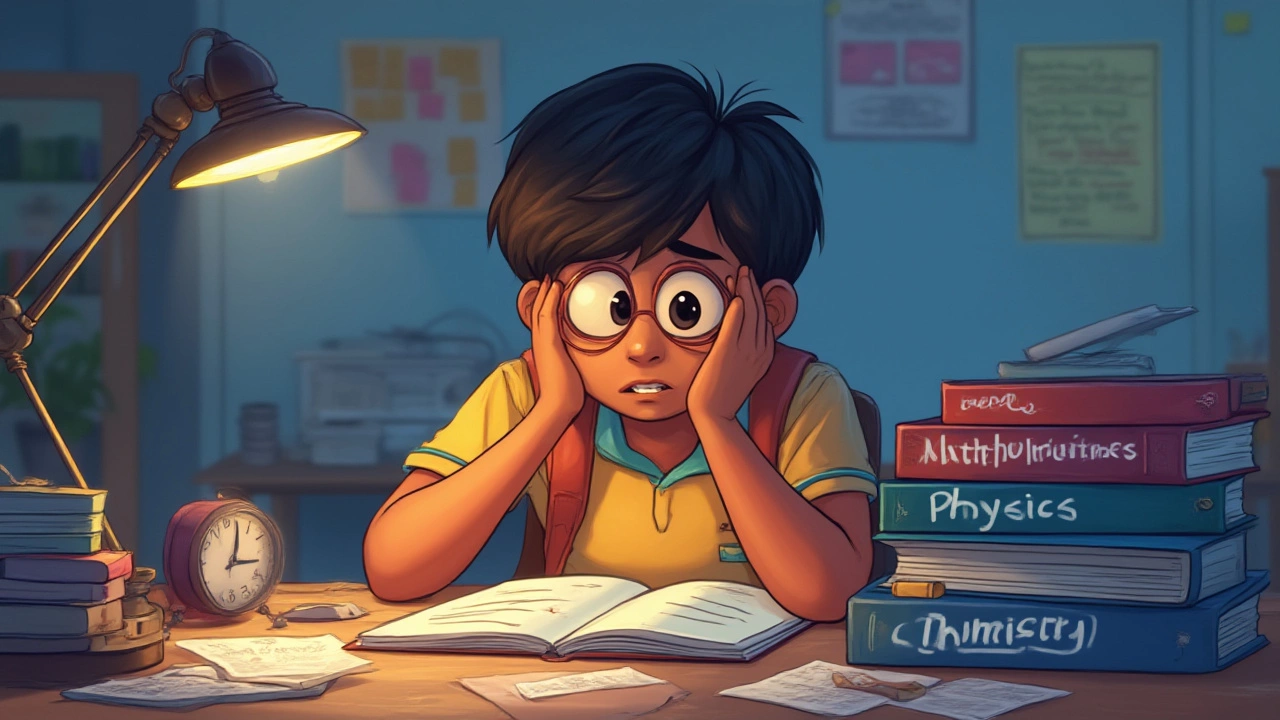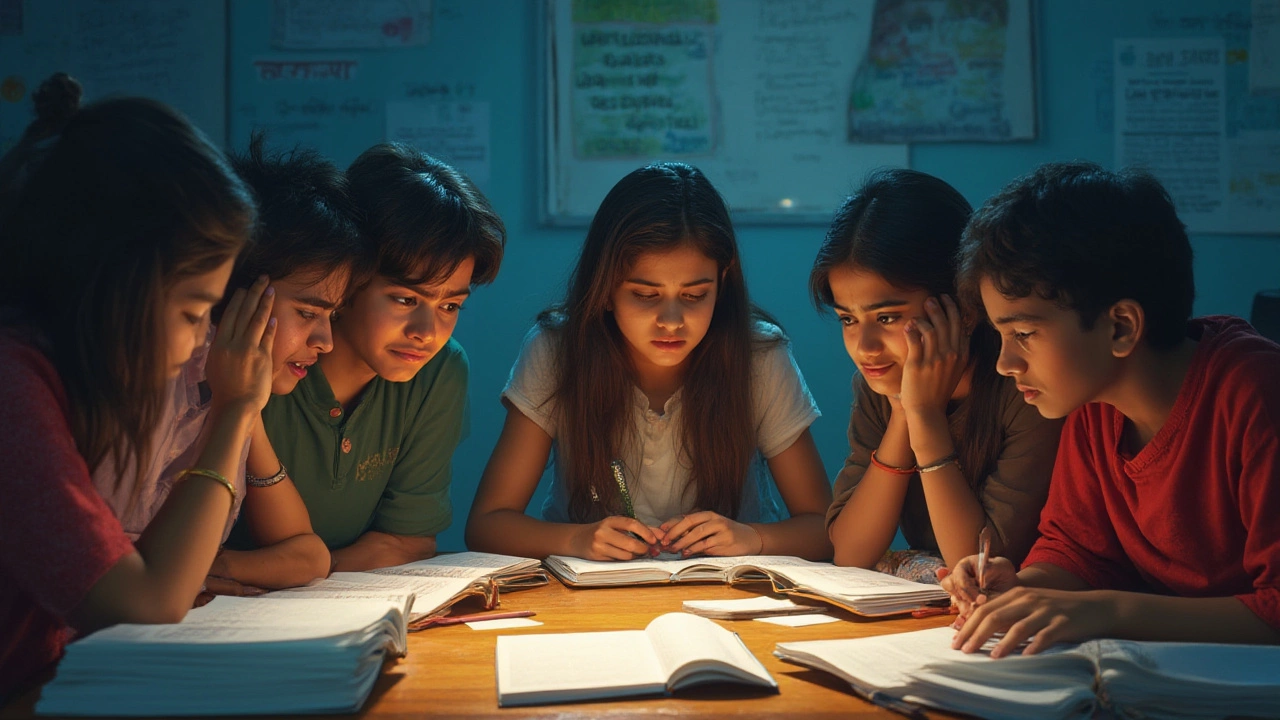There’s always that one subject which eats up your sleep, fills your weekends with worry, and keeps YouTube tutors busy. Ask any CBSE student about the toughest subject, and the answers start flying—maths, physics, chemistry, accounts, sometimes even English. What’s less talked about is why some subjects feel like climbing Everest while others just seem like a walk in the park. If you’ve ever wondered whether you’re alone in thinking something’s insanely hard, you’re not. The data, stories, and late-night rants all show patterns, and it’s about time we cracked them.
Why Some CBSE Subjects Have Legendary Fear Status
It’s tempting to blame everything on difficult textbooks. But the real answer is way messier. For one, CBSE isn’t just about mugging up and repeating answers. The curriculum is meant to push you into critical thinking; if you fall behind in one chapter, you risk being lost in the next. Mathematical subjects usually top the fear chart—especially maths and physics. In the 2024 CBSE board exam, almost 61% of students called mathematics the ‘hardest’ subject (CBSE-Results Twitter Poll, March 2024). Physics gets a close second, mostly for its heavy mix of logic, application, and memorization.
There’s also this mad competition pressure, especially for students aiming at JEE, NEET, or top colleges. They feel every mark could decide whether they make it to their dream course. Some subjects feel tougher because students don’t see their real-life use: "Where will I ever need calculus or organic reactions?" It’s a fair question—and adds another mental block. Another thing: the teaching style. Not every school has teachers who decode things in relatable ways. Students in smaller towns or resource-strapped schools often mention struggling more, not because they’re less smart, but because they miss out on helpful explanations, books, or extra classes others have.
Breaking Down the ‘Toughest’ List: Maths vs Physics vs Chemistry
Let’s put stereotypes aside and look at what students report, plus what the numbers say. The main contenders? Maths, physics, and chemistry. Arts and commerce students will argue for economics or accountancy, but science usually takes the crown for causing sleepless nights. In a survey of 2,000 CBSE Class 12 students published by Education World in February 2024, 42% picked maths as their nightmare subject. Physics wasn’t far behind at 35%, and chemistry at 14%—though organic chemistry is a villain on its own. Subjects like biology, accountancy, and even English literature can be tricky, but they rarely top these lists.
Why is maths so rough? It’s the foundation subject, stacked up year after year, and one weak link can sink your confidence fast. Not to mention, CBSE maths papers have a reputation for surprise elements—unusual problems, proofs that wander off the syllabus, and case studies. Physics combines maths with logic and out-of-the-blue applications. One student’s infamous comment on Reddit: “You think you get kinematics, until you see them throw an astronaut onto a seesaw.” Chemistry’s heavy memorization and volatile mix of theory and application mean it’s far from a walk in the park either.
Take a look at this breakdown of student responses from the Education World survey:
| Subject | Percentage of students labeling it 'toughest' |
|---|---|
| Mathematics | 42% |
| Physics | 35% |
| Chemistry | 14% |
| Biology | 5% |
| Accountancy/Economics | 4% |
Papers set in board exams can vary in difficulty by year, but the feeling remains—maths and physics lead the pack when it comes to student anxiety.

Why Do Some Students Find the Same Subject Easy?
We all have that friend who finishes a maths paper in half the time and walks out grinning. It’s not just about brain wiring—though, yeah, some people have patterns click faster. A lot rests on confidence and support. Students who dare to ask “why” instead of just memorizing “how” tend to do better. Those who make mistakes during practice, and actually learn from them, find things making more sense over time.
Let’s not overlook privilege—students with access to reliable internet, coaching classes, or just a supportive peer group have an edge. Parents or siblings who you can quiz (or moan to) help a ton. And then there’s the teaching style factor again. Some teachers encourage questions, give practical tips, or relate dull formulas to daily life. Others, not so much. Mindset matters too. If you walk into a subject convinced you’ll fail, your brain pretty much sets itself up for a struggle. The belief that “I’m just not a maths person” is a mental block—treating maths like a language and approaching it one step at a time makes a real difference.
Case in point: In the south Indian city of Kochi, a 2024 EduBridge study showed students with daily group study habits scored 16% higher in physics than those studying solo, mostly because they spent time explaining tricky bits to each other. So, teaming up to tackle tough topics might be more helpful than you think!
CBSE Reforms: Is It Getting Tougher or Easier?
There’s a rumor every year that ‘CBSE has made the papers easier,’ or ‘the syllabus is being cut.’ In 2024, CBSE did trim some chapters in maths and social science, but not enough to remove the core challenges. What many forget: the National Education Policy (NEP) changes are focused on deeper understanding rather than just rote learning.
The board’s been rolling out competency-based questions—those case study types and application-based problems you see now. They sound scarier, but actually aim to test if you understand the concept, not just the formula. The number of direct-answer, memorization types has dropped to 30% in the recent papers. Percentage of application questions? Up to 44% in the 2024 maths and science exams. This shift can make life rough for students used to cramming—but it rewards those who are curious and willing to dig deeper.
CBSE’s official data for 2024 showed subject-wise pass percentages looking like this:
| Subject | Pass Percentage |
|---|---|
| Mathematics | 86% |
| Physics | 89% |
| English Core | 97% |
| Chemistry | 93% |
| Biology | 95% |
Still, just because most pass doesn’t mean all find it simple. The gap between passing and acing the subject is real—what matters for most is that top percentile where competition is fierce.

How To Survive—and Even Ace—the Hardest CBSE Subjects
Getting through that one dreadful subject takes some brutal honesty and a set of practical moves. First step: figure out where you actually get stuck. Is it understanding what the question wants? Is it memorizing steps? Or maybe it’s just battling basic fear? Self-diagnosis helps cut wasted effort. Here are some no-fluff tips from students who’ve pulled off miraculous turnarounds in CBSE:
- For maths, stop relying only on class notes or guidebooks. Tackle NCERT first, then explore reference problems. Don’t skip the tricky “examples”—these are gold for cracking logic.
- Physics depends heavily on understanding, not just memorizing formulas. Draw diagrams, break problems down, and teach or explain concepts to someone else. Teaching is magic that reveals gaps fast.
- Chemistry: Set aside weekly chunks for organic, inorganic, and physical—don’t mix them up. Flashcards for reactions, mnemonics for periodic trends.
- Try solving old board papers within strict time limits. You’ll spot patterns in types of questions and won’t panic during actual exams. CBSE releases sample papers and marking schemes every year, so make those your best friends.
- Don’t downplay the power of group study sessions, but keep them focused—no snacking chats or social media distractions. One hour of serious doubt-solving beats three days of solo confusion.
- Get help early—teachers, online doubt-forums, or YouTube explainers. There’s no point suffering in silence until last night!
For the digital-savvy, use active apps like Toppr, Khan Academy, or BYJU’S but avoid over-relying. Use them as supplementary—not a replacement for actually grinding through your textbook exercises.
It’s okay to have a weak spot; almost nobody is a superhuman who finds every CBSE subject easy. The trick is chipping away at the fear, step by step. Every time you tackle a tough problem or dare to ask a dumb-sounding question, you’re basically upgrading your brain. And that’s worth more than a board percentage. So, which is the CBSE toughest subject? The honest answer: it’s different for everyone, but with the right hacks, none of them are unbeatable.
